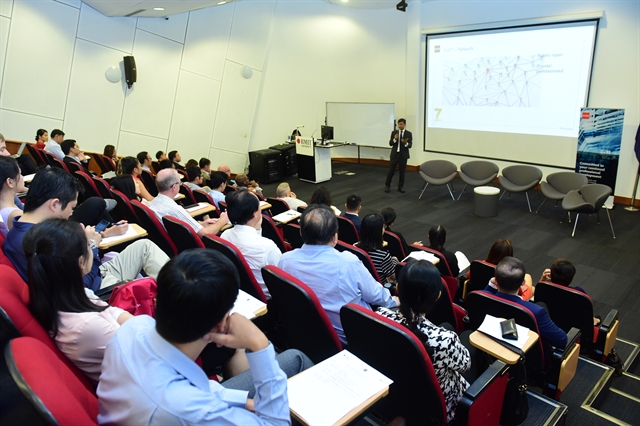Experts and decision-makers discussed the latest developments on blockchain alongside the risks and opportunities of cyber security at a conference joinly held in HCM City on Thursday.

Experts and decision-makers discussed the latest developments in blockchain and the risks and opportunities related to cyber security at a conference held by the Association of Chartered Certified Accountants (ACCA) and RMIT University Vietnam in HCM City on Thursday.
Digital Trends: Blockchain & Cybersecurity sought to provide an overview of blockchain’s impact on all aspects of everyday life, with new technologies also changing and disrupting the financial industry and the way consumers and firms access financial services.
Participants agreed that despite many challenges and risks to be addressed, such as fraud, market manipulation and money laundering, crypto assets, initial coin offering (ICO) and blockchain would play a key role in future.
Narayanan Vaidyanathan, head of Business Insights, ACCA, said blockchain technology allows users to develop applications that can run within decentralised economic systems in a way that was never thought possible before, but the technology is still at a very early stage.
“A key challenge will be to strike the right balance. While it’s vital to create a supportive environment to enable innovation and not hamper it and to encourage job creation, threats to citizens, investors or unsophisticated consumers as well as to financial stability have to be taken seriously.
“That is not an easy task bearing in mind that cryptocurrencies do not know any borders.”
He said it was also important to avoid blaming the house for the fault of the people living in it. The underlying distributed ledger technology behind Bitcoin could revolutionise how financial transactions are done and have a positive impact on business globally.
“This potential must be viewed separately from the risks of Bitcoin.”
Associate Professor Mathews Nkhoma, head of the School of Business & Management, RMIT Vietnam, said: “Rapidly growing connectivity and the accelerating pace of digital transformation make Asia, and particularly Viet Nam, vulnerable to cyber exploitation.”
A report by Marsh & McLennan Companies in 2017 about cyber risks in the Asia Pacific said Asian organisations take 1.7 times longer than the global median to discover a breach, and 78 per cent of internet users in Asia have not received any education in cyber security.
Nkhoma said Viet Nam was among the top 10 countries in terms of most targeted attacks from 2015 to 2017, and in 2017 lost U$542.8 million to cyber attacks.
At the conference, there was a consensus among speakers that a balanced approach is needed to understand the economic functions of innovations and the risks and benefits they may bring.
The debate also emphasised the urgent need to invest in the skills of people in companies and universities since, with fintech, financial knowledge is interdependent with IT competencies. Finance professionals and professional accountants will need to adapt to this fast-moving landscape and maintain an up-to-date understanding of developments to be able to guide their clients and organisations who are seeking funding.
Nguyen Thuy Minh Chau, head of Mekong, said as the world’s most forward-thinking professional accountancy body, ACCA’s approach is to look ahead and engage proactively with key trends that could shape tomorrow’s professional world.
“Digital is arguably the biggest factor shaping the future of the profession and the future roles our students and members will perform.” — VNS





